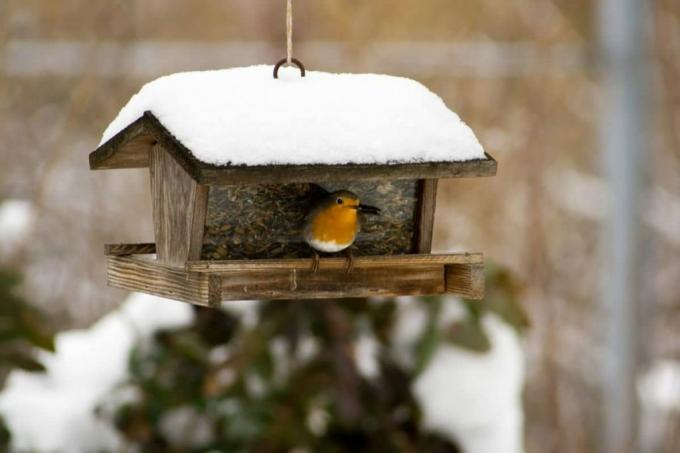
table of contents
- List of food
- Robin food in winter
- Prepare robin food yourself
- Facilitate foraging in the garden
- frequently asked Questions
While you are gardening, you may find yourself suddenly joined by a robin looking for food. What do the cute songbirds eat? How can you help them find food?
In a nutshell
- Robins are part migrants, some spend the winter in Germany
- the diet includes insects, worms and berries
- Ecological gardening without chemicals preserves robins' habitats
- the birds are curious and trusting
- Foraging for food usually takes place hopping on the ground
List of food
European robins (Erithacus rubecula) prefer to eat:

- Insects and their larvae
- be crazy
- worms
- Beetle
- To fly
- little snails
In the cold season, when only a few insects can be found, they feed on berries.
Robin food in winter
A large number of the beautiful birds with the red belly stay in Germany in winter. Birds have a hard time finding enough food, especially in harsh winters. You can forage them with one Bird feeder facilitate. But be careful, robins only eat soft, fatty food. They cannot eat the hard grains of many bird feed mixes. When buying mixes, make sure they are suitable for your garden birds.
Robin food contains:
- oatmeal
- peeled sunflower seeds
- Raisins
- chopped peanuts
- peeled oat curd
- chopped corn kernels
- yellow millet
- dried mealworms

This mix also attracts blue tits, great tits, blackbirds, thrushes, nuthatches, and starlings.
Note: Leftover food is not suitable for the native bird species and does not belong in the bird feeder!
Cheap birdseed mixes often contain ragweed seeds. If you want to prevent the plant from spreading in your own garden, you can prepare the birdseed yourself.
Prepare robin food yourself
Ingredients:
- 500 grams of beef suet
- 3 tablespoons of cooking oil
- oatmeal
- yellow millet
- Corn
- Raisins
- peanuts
- peeled sunflower seeds
- dried mealworms
Instructions:
- Warm beef suet in a water bath
- Add cooking oil
- Chop all the ingredients and mix with the liquid fat
- Allow to cool slightly
- Fill into containers or shape with greaseproof paper

Facilitate foraging in the garden
Everyone can help protect the robin in their garden. Do without pesticides and design your garden close to nature. Piles of brushwood and leaves are an important refuge for insects, which the red-bellied garden bird feed on. If you don't clean up your property completely, you can enjoy the curious songbirds all year round.
frequently asked Questions
Bushes and hedges are an important habitat for the robin. Do not cut off all the faded inflorescences in autumn. Leave some as winter quarters for insects. The winter birds find food in this way. Put a bird feeder and bird baths in sheltered places. Cover the compost heap in winter to give birds easier access to insects.
The feed must be protected from moisture. Likewise, no feces should get between the birdseed, as diseases can be transmitted through it. Make sure that the bird feeder is regularly filled and cleaned. Do not use harsh chemicals to clean up.
The garden birds can be fed all year round. The prerequisite is compliance with hygiene at the feeding stations and the supply of suitable feed. All year round feeding is recommended by bird protection associations to preserve the bird world. Design your garden close to nature to protect birds and insects.


